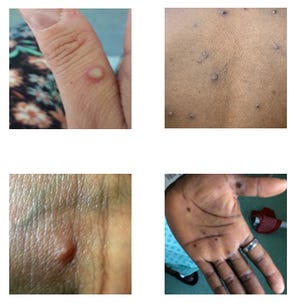DAP Health CEO David Brinkman said in a statement he is “devastated” by the number of people suffering due to the current monkeypox outbreak, but that the “pain and suffering could have been avoided” with a swift response from the U.S. government.
As of Monday, there have been more than 23,000 confirmed cases of monkeypox reported in 80 countries since Jan. 1, according to the Centers for Disease Control and Prevention. In Riverside County, there have been 34 confirmed and probable cases reported.
The last time the Western hemisphere faced a monkeypox outbreak was in 2003 due to imported small mammals from Ghana. Brinkman said experts predicted another would occur, and that it would be toughest among marginalized communities who face barriers to health equity, like the HIV/AIDS and COVID-19 pandemics.
“We went from 1 monkeypox case in May to 5,000+ preventable cases today,” Brinkman said. “I am devastated by how many people are in horrific pain. Pain and suffering could have been avoided had the U.S. followed its own predictions and prepared to respond.”

Monkeypox: Are vaccines available in Palm Springs? What does it look like? Answers to your questions
Related: ‘This vaccine should be here right now’: Residents frustrated over low monkeypox vaccine supply
Monkeypox is a rare disease caused by the monkeypox virus. The first human case was reported in 1970 in the Democratic Republic of Congo, according to the CDC.
People usually become infected through close contact with skin lesions or bodily fluids of infected animals or humans (alive or dead), including droplets, and through sexual contact. Those at highest risk of infection during the current outbreak have been gay, bisexual and other men who have sex with men, but the virus can infect anyone.
Symptoms can occur five to 21 days after exposure, and include fever, headache, muscle aches, swollen lymph nodes, rash and lesions often in the genital and perianal region. Illness typically lasts for two to four weeks.
On July 23, the World Health Organization declared monkeypox a global public health emergency. There are many issues that make the situation an emergency, Brinkman said, including that the U.S. had access to tests, medications and vaccines that could be used for monkeypox, “yet our highest-risk populations still do not have access to it.”

He added that “organized political discrimination against LGBTQ+ populations has been steadily increasing.”
“It took until July 23 for the WHO to declare monkeypox a global health emergency — stating it was partly because the disease had not moved out of the primary risk group, men who have sex with men,” Brinkman said. “Sadly, it should come as no surprise the U.S. response remains slow and inadequate for LGBTQ+ community members worried about contracting monkeypox and to the thousands of people who have already been diagnosed.”
“The only reason the monkeypox virus has not been contained is that the U.S. has yet to treat this threat to the health of gay, bisexual and transgender people as the health emergency it is,” he continued. “New York and San Francisco, both early in the response to HIV and COVID, have declared a state of emergency. Like DAP Health, they have been here before and they know that now is the time for a coordinated and swift response.”
Brinkman’s statement echoed many concerns and frustrations Coachella Valley residents shared with state and county health officials during a monkeypox town hall meeting. With a high concentration of gay, bisexual and other men who have sex with men in the valley, along with tourists who come through the area, residents said many more vaccine doses and treatment options should have already been available.
Other local officials have said more needs to be available in the Palm Springs area to combat the virus.
More: Palm Springs isn’t getting enough monkeypox vaccines, say DAP Health and Rep. Raul Ruiz
More: Palm Springs mayor calls on CDC, CDPH to shift strategies with monkeypox vaccines
County spokesperson Jose Arballo Jr. said on Friday the county will receive an additional 1,396 vaccine doses for monkeypox on top of the slightly more than 1,000 doses it was initially allocated. When doses arrive, 80% will be distributed to community partners and 20% will remain with Riverside County Public Health.
DAP Health, which serves around 10,000 patients annually, has received a total of 497 doses of the Jynneos vaccine, which requires two doses, four weeks apart. The organization administered all 160 doses of the Jynneos vaccine available in its first allotment from Riverside County Public Health, and it received an additional 337 doses on Friday.

Because supplies are limited, vaccine doses are being administered to certain people, such as high-risk DAP Health patients, community members with a known monkeypox exposure, sex workers, massage therapists and those engaging in group sex. Invitation-only Saturday vaccine clinics will begin on Aug. 6.
In addition to possibly preventing monkeypox, the vaccine may also lessen symptoms in people who have been exposed.
Brinkman said DAP Health still has not received supplies of TPOXX, a medication approved by the FDA for smallpox but not monkeypox.
“LGBTQ+ organizations should be the priority for vaccine supply and medications for treatment; because our approach strengthens the LGBTQ+ community,” Brinkman said. “To end monkeypox, we must confront the discrimination in the U.S. that has enabled this preventable crisis.”
DAP Health has launched a monkeypox hotline, which can be reached at 760-656-8432 or MPX@daphealth.org, for community members who have questions or concerns regarding the virus.
Ema Sasic covers entertainment and health in the Coachella Valley. Reach her at ema.sasic@desertsun.com or on Twitter @ema_sasic.








